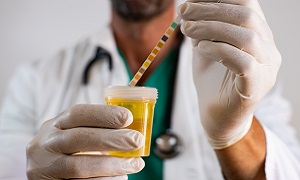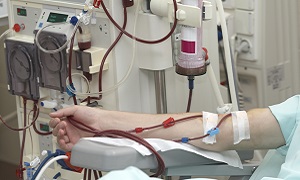Best Doctors in India for Acute Kidney Failure Treatment
Best Hospitals in India for Acute Kidney Failure Treatment
W Pratiksha Hospital, Gurgaon
- City: Gurugram, India
Hospital Highlights:
- W Pratiksha Hospital, Gurugram, is one of the best hospitals in the NCR region. It is also a top hospital in India for IVF. Since its inception, the hospital has performed over 5500 successful IVFs. The hospital also specializes in gynecology.
- With over 20 years of experience in providing quality healthcare, the hospital is known as one of the most trusted and valued health providers in India.
- Equipped with world-class medical facilities and advanced technology, the hospital’s doctors and clinicians also have a track record of delivering excellent results. The hospital is also known for focusing on preventive well-being as much as on curative treatment.
- The hospital has earned the trust of its patients, by providing the best available treatments at affordable costs.
Narayana Superspeciality Hospital, Gurugram
- City: Gurugram, India
Hospital Highlights:
- Situated near DLF Cyber City, Gurugram, Narayana Superspecialty Hospital is one of the top medical facilities in the Delhi NCR region, catering to the needs of the people. Known for its commitment to quality medical care and patient service, the hospital is a state-of-the-art facility with planned and well-equipped sections, which includes a spacious OPD area as well as comfortable patient rooms.
- It is the closest super-specialty hospital from Indira Gandhi International Airport towards Gurugram, and also the nearest super specialty hospital from DLF Cyber City. It is also close to major residential areas in Gurugram.
- It is part of the renowned Narayana Health Group. Established in 2000, by Dr. Devi Shetty, a renowned cardiac surgeon, it has grown to be one fo India’s leading healthcare groups.
Sir Ganga Ram Hospital, New Delhi
- City: New Delhi, India
Hospital Highlights:
- Sir Ganga Ram Hospital, New Delhi is known to provide the latest medical procedures with the latest technology in all of its units.
- The hospital has a team of reputed doctors, nurses, and healthcare professionals that ensure that patients receive quality care at affordable costs.
- Staffed with a team of highly qualified doctors, dedicated nurses, and paramedical and non-medical staff, the hospital aims to lead in healthcare delivery, medical education, training, and research.
- As per the vision of the founder, the hospital also provides free treatment to the economically weaker sections of society.
- Sir Ganga Ram Hospital also provides training to young doctors under the Diplomate in National Board(DNB) program. The DNB program at the hospital was started in 1984 and it is known for currently running the maximum number of DNB specialties in the country. It also has the distinction of having the first bone bank in India.
CK Birla Hospital, Gurugram
- City: Gurugram, India
Hospital Highlights:
- The CK Birla Hospital in Gurugram is a NABH-accredited multi-specialty hospital.
- The hospital strives to increase the quality of healthcare by focusing on UK NHS nurse and midwife training requirements. Policies and practices derived from the National Institute for Health and Treatment Excellence (NICE) recommendations in the United Kingdom ensuring that a strong focus on safety, high-quality clinical care, and sanitation is maintained.
- The hospital’s cutting-edge technology and facilities allow for real-time communication and seamless collaboration among caregivers, ensuring accuracy and the best possible results. Those with foreign experience and accreditations make up part of the hospital’s team of clinicians.
KIMS Hospital, Hyderabad
- City: Hyderabad, India
Hospital Highlights:
- KIMS Hospital (a brand name of Krishna Institute of Medical Sciences) is one of the largest and best multi-speciality hospitals in Hyderabad. The hospital provides various treatments to an enormous number of patients.
- The hospital has a capacity of more than 3000 beds. KIMS Hospitals offers different healthcare services in more than 25 specialities and super specialities.
- The hospital is equipped with modern medical equipment and technology. It has robotic equipment to provide minimal invasive techniques for patients.
- The hospital is aimed at providing world-class healthcare facilities and services at an affordable cost for patients.
- The various specialities and departments of the hospital include neurosciences, gastroenterology & hepatology, robotic science, reproductive sciences, dental science, oncological sciences, organ transplantation, heart and lung transplantation and mother and child care.
Fortis Hospital, Shalimar Bagh
- City: New Delhi, India
Hospital Highlights:
- Fortis Hospital in Shalimar Bagh is a multi-super specialty hospital that strives to provide world-class patient care by leaving no stone unturned.
- Fortis, Shalimar Bagh, with 262 beds and a 7.34-acre footprint, provides the best level of medical care through its team of doctors, nurses, technicians, and management professionals.
Reliance Hospital, Mumbai
- City: Mumbai, India
Hospital Highlights:
- Reliance Hospital is one of the best super-specialty care hospitals in Navi Mumbai.
- The main purpose of this hospital is to become a trustworthy place for the best health and hope for society. The hospital is well connected to the suburbs of Mumbai and Navi Mumbai.
- The hospital has various specialty departments, viz., Accident & Emergency, Anesthesiology, Dental Services, Dermatology, Diabetology, Dietetics Nutrition, Endocrinology, ENT, Gastroenterology, General Surgery, Gynaecology And Obstetrics, Hepato Pancreato Biliary Surgery, Infectious Disease, Internal Medicine, Interventional Radiology, Laboratory Medicine, Minimal Access Laparoscopic Surgery, Nephrology, Neurosciences, Opthalmology, Orthopaedics, Paediatrics, Pain Management Palliative Care, Physical Medicine Rehabilitation, Plastic And Reconstructive Surgery, Psychiatry, Pulmonary Medicine, Radiology, Rheumatology, Transplant, Urology Andrology, Vascular Surgery
Lilavati Hospital & Research Centre, Mumbai
- City: Mumbai, India
Hospital Highlights:
- Lilavati Hospital & Research Centre is India’s premier multi-speciality tertiary care hospital and has been recognised as a global medical excellence centre.
- Lilavati Hospital & Research Centre has built an unrivalled level of trust with its patients over the years, thanks to a solid foundation that comprises cutting-edge facilities, the best medical competence, research, education, and charity endeavours.
- The hospital is quite proud of the fact that it now serves patients from all kinds of backgrounds, not just from the United States but from all around the world.
- The hospital has a total of 323 beds, one of the largest Intensive Care Units (ICUs), 12 Operation Theatres with modern amenities, over 300 consultants, and almost 1,800 personnel.
MGM Healthcare, Chennai
- City: Chennai, India
Hospital Highlights:
- Located in Chennai, India, MGM Healthcare is a top multispecialty hospital that provides all medical services under one roof.
- Since its founding in 2019, MGM Healthcare has quickly become a leading national referral centre, creating several innovative flagship initiatives.
- MGM Healthcare combines next-generation medical and digital technologies to provide better patient results.
- With 12 centres of excellence, more than 400 inpatient beds, 100 intensive care unit beds, and 24/7 emergency care, MGM Healthcare leaves no chance in redefining the patient experience in Chennai.
- MGM Healthcare boasts 250+ expert doctors across 30+ departments, including Cardiology, Pulmonology, Neurology, Obstetrics & Gynaecology, and more.
- They house 12 specialized Centres of Excellence, including Neurosciences, Orthopaedics, and Multi-Organ Transplantation.
- Their team of doctors, nurses, and paramedics works together to give every patient individualized treatment.
ACUTE KIDNEY FAILURE
Acute kidney failure, which is also termed as acute renal failure, is a condition which occurs when your kidneys suddenly stop working. It can happen in just a few hours or days.
This condition is not always permanent, and your kidneys can return to normal function, if you receive immediate treatment right away, and if you are not having other serious health problems.
The main purpose of the kidneys is to filter out the waste from your blood. They also need to remove any extra fluid that is in your blood, which becomes your urine. Kidneys also help in making red blood cells as well as regulating electrolytes.
When kidneys are damaged, they are unable to work well. This could happen due to another health condition, such as diabetes. When there is a decrease in kidney function which happens over a longer period of time, it is known as chronic kidney failure.
Symptoms
You may not show any symptoms of acute kidney failure, and it might be discovered by your doctor during a lab test for another reason.
However, if you do show symptoms, then they are going to depend on how severe your condition is. Some of them might include:
- Urinating less than normal
- Itching
- Joint pain, swelling
- Swelling in your legs, ankles, and feet
- Feeling very tired or drowsy
- Throwing up or feeling like doing so
- Chest pain or pressure
- Confusion
- Shortness of breath
- Loss of appetite
- Muscle twitching
- Stomach and back pain
- Fever
- Seizures or coma (in severe cases)
- Rash
- Nosebleed
Causes
Acute kidney failure occurs when you have a condition which can slow the flow of blood to your kidneys, or if you experience any direct damage to the kidneys. In some cases, your kidney’s urine drainage tubes, i.e. ureters, can get blocked, due to which wastes might be unable to leave the body through your urine.
Certain conditions can slow blood flow to the kidneys, which can cause kidney injury. These include:
- Blood or fluid loss
- Heart disease
- Infection
- Liver failure
- Blood pressure medications
- Heart attack
- Use of medications such as aspirin or ibuprofen
- Severe allergic reaction
- Severe dehydration
- Severe burns
There are also diseases and conditions, which can damage the kidneys which can lead to acute kidney failure. They include:
- Blood clots in the veins and arteries in as well as around the kidneys
- Glomerulonephritis, which is an inflammation of the tiny filters of the kidneys
- Cholesterol deposits which can block blood flow in your kidneys
- Hemolytic uremic syndrome, a condition resulting from premature destruction of red blood cells
- Viral infection, such as with the virus that causes coronavirus disease 2019 or COVID-19
- Certain chemotherapy drugs, antibiotics, and dyes used during imaging tests
- Lupus, an immune system disorder that leads to glomerulonephritis
- Scleroderma, a group of rare diseases which can affect your skin and connective tissues
- Toxins, like alcohol, heavy metals or even cocaine
- Thrombotic thrombocytopenic purpura, which is a rare blood disorder
- Muscle tissue breakdown or rhabdomyolysis, that leads to kidney damage caused by toxins from the destruction
- Breakdown of tumor cells which can lead to the release of toxins, which can cause an injury in the kidney
Several diseases or conditions that can block the urine from passing out of the body may also cause acute kidney injury. They include:
- Bladder cancer
- Colon cancer
- Enlarged prostate
- Blood clots in the urinary tract
- Cervical cancer
- Kidney stones
- Nerve damage involving the nerves controlling the bladder
- Prostate cancer
Diagnosis
If your signs and symptoms are suggesting that you might have acute kidney failure, then your doctor might recommend certain tests and procedures in order to verify the diagnosis. These can include the following:
Urine output measurements
Blood tests
Urine tests
Imaging tests
Removing a sample of kidney tissue for testing

Treatment
Your treatment is going to depend on what your cause of acute kidney failure is. The goal of the treatment is to always restore the normal function of the kidneys. It is also important to prevent fluids and wastes from building up, during the recovery of the kidneys. In most cases, the evaluation is made by a kidney specialist known as a nephrologist.
Diet
Medications
Dialysis
Complications
Certain complications which can arise from acute kidney failure include:
- Chest Pain- If the lining covering your heart, i.e. pericardium becomes inflamed, you might experience chest pain.
- Fluid Buildup- Acute kidney failure might lead to a buildup of fluid in the lungs, which can cause shortness of breath.
- Muscle Weakness- Muscle weakness can be caused by your body’s fluid and electrolytes, and your body’s blood chemistry when they are all out of balance.
- Permanent Kidney Damage- Generally, acute kidney failure can lead to permanent loss of kidney function or even end-stage renal disease.
- Death- Acute kidney failure might also lead to loss of the function of your kidneys, and even death.
Prevention
Though it is generally hard to predict or prevent, taking a few steps can reduce your risk of developing acute kidney failure.
If you have kidney disease or any other condition, which can increase the risk of acute kidney failures, such as diabetes or high blood pressure, then follow your doctor’s recommendations to manage your condition.
Make a healthy lifestyle a priority. Make sure that you are active, and eat a sensible and balanced diet. If you drink alcohol, do it in moderation.
















